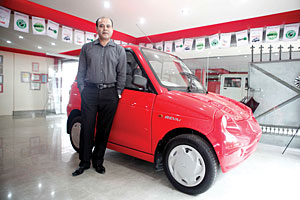 BIKRAM RAI |
But the electric cars are likely to gain more popularity among urban Nepalis now that Agni Incorporated, the authorised distributors of Mahindra vehicles in Nepal, has been granted dealership of Revas.
The Indian multinational bought half the stake in the Bangalore-based company earlier this year which makes the California-designed car that was introduced in Nepal in 2000 by Eco-Vision.
"Reva is not a new name in Nepal, but we intend to increase its visibility by marketing the brand intensely," says Cabinet Shrestha (pic, above) of Agni Incorporated, which has been the dealer for Mahindra in Nepal. "Extending the partnership in electric vehicles was a mutually beneficial agreement for both of us." Shrestha plans to market the car outside Kathmandu as well, starting with Pokhara and Lumbini.
With the fuel crisis certain to get more acute and petrol more expensive, electric cars are the perfect environment-friendly addition to Kathmandu's roads. The little Reva is often described as "cute" and lets the driver manoeuvre through chaotic traffic and narrow alleys effortlessly and needs very little space for parking.
For those who are skeptical of buying electric vehicles in a country with chronic load shedding, Agni says the car can be charged at home by plugging it to a 220v wall socket for three hours and can run 80km on full charge. The operation cost is less than that of a two-wheeler. Says Shrestha: "It is more or less like charging your mobile phone."
When Reva was first introduced, it was subjected to the same tax rate as petrol and diesel vehicles, making it too expensive for most Nepalis. Only diplomatic missions and international agencies who did not have to pay the tax could afford the cars.
But after intense lobbying by green groups, the Reva is now levied 40 per cent excise duty, 13 per cent VAT and is exempt from paying the annual road tax. This has meant that there are many more Revas with red number plates. The easy to drive car is a favourite among female drivers in Kathmandu.
Green groups say the cut in import duty is not enough for fully electric or hybrid vehicles, especially if they are used for public transportation.
"We have been vigorously lobbying with the state to reduce tax on zero emission vehicles. The government should not make it expensive to be green," says Shrestha.
With the formal launch of Reva DLX last Sunday, Agni Incorporated says its promo drive is already a big success with a flood of new orders.
Read alo:
Adventures of a battery bug, Kunda Dixit's East West blog


